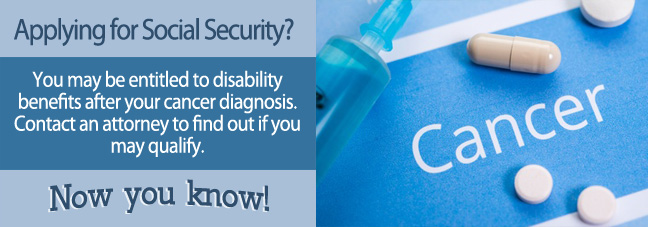If you have been diagnosed with cancer and are unable to work as a result, you might qualify for Social Security Disability benefits. For some individuals, especially those with aggressive types of cancer, the approval process might be relatively straightforward.
In fact, certain types of cancer qualify for an expedited application process through a Compassionate Allowance. For other equally deserving individuals, the process might consist of denials and appeals.
Your chances of approval rest predominantly on your ability to provide sufficient medical evidence regarding your cancer.
If you are over the age of 50, you may have an advantage when applying for Social Security Disability Insurance (SSDI) benefits. The Social Security Administration (SSA) recognizes that it might be challenging to learn a new line of work after the age of 50, especially for someone with limited education or skills.
Further, employers are less likely to hire older individuals, especially those who are ill. As such, the medical-vocational guidelines, or “grid rules” were developed to assist disability evaluators in deciding on your cancer claim.
Grid Rules and Cancer
If you have been diagnosed with cancer and you do not meet a listing in the Blue Book, the SSA will turn to the grid rules to determine whether or not you can work in another field or if you are able to work at all.
In addition to your age, you will be evaluated for your education level, any skills that you have acquired over the years, as well as your work history for the past 15 years.
A Social Security administrator will ensure that a Residual Functional Capacity (RFC) evaluation has been completed for you. Your RFC will determine the maximum amount of work that you can perform and will be classified from less than sedentary to very heavy work.
There is a separate grid for each level of exertion that the SSA has determined you are capable of performing. It is important to remember that the grid rules apply only to physical disabilities. Many people with cancer also suffer from mental impairments such as depression or anxiety.
It is important to make sure that any psychological difficulties that you are experiencing as related to your cancer are included in your medical records.

What Type of Work Can Someone with Cancer Do?
The type of work that someone with cancer could perform will depend entirely on the type of cancer, the extent of the illness, and the medications or treatments that are required.
For example, if you have breast cancer, you may have been told that you should not lift over five pounds. Further, you may experience pain or weakness in one or both of your arms. Performing a job as a hair stylist may prove to be impossible if you have breast cancer.
The type of job that you can perform will also depend on your treatment schedule. If you are actively getting chemotherapy or radiation, you may not be able to reliably arrive at work every day. Further, most cancer patients share one common symptom: extreme fatigue.
Depending on your line of work, it may be difficult to stay alert and focus, especially if your job requires great concentration or attention to detail.
Meeting a Blue Book Listing for Cancer
There are over 30 different categories of cancer listed in the Blue Book, the SSA’s official list of impairments. There is an entire section, 13.00, devoted to cancer.
The Blue Book includes several illnesses and the specific criteria that you must have in order to “meet the listing.” Meeting a listing is the easiest way to qualify for Social Security Disability benefits.
For example, skin cancer is listed in section 13.03 of the Blue Book. To qualify for a Blue Book listing for skin cancer, you will need to have a sarcoma or carcinoma that has spread, or metastasized, beyond the regional lymph nodes. Alternatively, your carcinoma must have invaded deep tissues, such as muscle, cartilage, or bone.
Should I Discuss My Case with a Disability Lawyer or Advocate?
As you have likely realized, the rules surrounding SSDI are complex. While you certainly have an advantage if you are over the age of 50, you will still have many obstacles to overcome in winning your claim.
The grid rules are complicated and are sometimes interpreted differently depending on the reviewer or judge. An experienced Social Security Attorney or Disability Advocate can assist you in navigating this complex application process, thus offering you the best chance for approval of your claim.
Return to A Guide to Cancer and Social Security Disability Benefits.